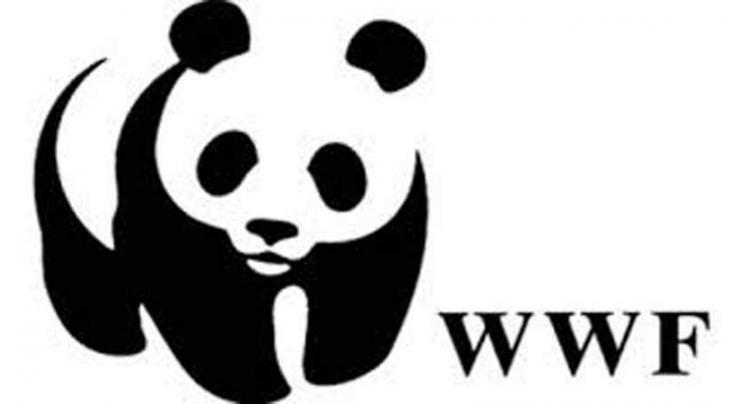
On World Water Day, WWF-Pakistan Urges Collective Action
Umer Jamshaid Published March 22, 2019 | 09:24 PM

To mark World Water Day 2019, WWF-Pakistan organized seminars and workshops at various universities and textiles mills in different cities
Lahore (UrduPoint / Pakistan Point News - 22nd March, 2019) To mark World Water Day 2019, WWF-Pakistan organized seminars and workshops at various universities and textiles mills in different cities.
Water resources are under immense pressure from climate change, soaring demand for water in domestic, agriculture and industrial sectors. There is an urgent need for communities, companies and governments to come up with innovative solutions to secure water that can help maintain the balance between people and nature.
This was highlighted by Hammad Naqi Khan, Director General, WWF-Pakistan on World Water Day (WWD) today. This environmentally significant day is celebrated globally to highlight the importance of water related issues by raising awareness and encouraging policymakers to look into sustainable development initiatives in cities as a support to lessen stress on urban water systems.
The theme of WWD this year is Leaving No One Behind, which focuses on Sustainable Development Goal (SDG) 6 and aims to ensure availability and sustainable management of water for all by 2030. This theme also highlights the importance of working together for solutions to current water problems.
Freshwater is the lifeblood of our planet. It sustains life on Earth, is a human right, a social need and underpins most economic activity, which is why WWF’s Global Water Goal is to ensure that freshwater ecosystems and their services sustain people and nature.
It is important to value Pakistan’s water bodies, particularly rivers and lakes. To achieve SDGs, it is urgent to manage them efficiently and conserve other water resources. Due to mismanagement and ill-planning of water resources Pakistan is a water scarce country and Pakistan’s per capita surface water availability has declined from 5,260 cubic metres per year in 1951 to around 930 cubic metres today, which is likely to drop further to about 860 cubic metres by 2025.
The rapid rise in population will further aggravate the water situation. Water, ecosystems and their impact on human development require collective action and business ecosystem strategies. WWF-Pakistan is an advocate of environmental flows in rivers and acknowledges the efforts of the government of Pakistan for announcing National Water policy (2018), Climate Change policy and supports the proposed initiatives in these documents such as initiatives in groundwater management, recharge mechanism in the urban and rural areas, promoting the resource efficiency in the industries, promoting different techniques of rainwater harvesting system, floodplain management and water allocation.
Currently the organization is working with the government and private sector to reduce their water footprint in industrial processes and enhance environmental compliance under the International Labour and Environmental Standards applications in Pakistan’s SMEs (ILES) project in collaboration with the International Labour Organization and funded by the European Union.
Sohail Ali Naqvi, Manager Freshwater, WWF-Pakistan said, “Everybody is familiar with the water challenges in Pakistan and it is now the right time to collaborate and find solutions to the water problems of the region.” In Sialkot in collaboration with University of Gujrat celebrated WWD and organized a seminar on water awareness where Mr.
Rizman, Provincial minister for Environment participated as the chief guest of the ceremony" In Faisalabad, WWF-Pakistan in collaboration with All Pakistan Textile Mills Processing Associations (APTPMA) organized a session with stakeholders on the importance of water for the businesses.
WWF-Pakistan presented the water work on the "Water situation and proposed solutions in Pakistan" among the medical students in Allama Iqbal Medical College organized by SYNCH AIMC (A national association of medical students)
Related Topics
Recent Stories

Rizwan’s batting order may be changed: Sources

Nawaz Sharif to visit Guangzhou exhibition in China

FM Dar not traveling to China: Foreign Office

PM takes notice of deliberate delay in tax cases

Iranian President visits Allama Iqbal’s mausoleum

Iranian President arrives in Lahore today

Currency Rate In Pakistan - Dollar, Euro, Pound, Riyal Rates On 23 April 2024

Today Gold Rate in Pakistan 23 April 2024

Islam enlightened world with its teachings about knowledge: Dr Jamileh

Record London close as oil prices drop on easing Middle East fears

TV tower in Kharkiv struck as Russia captured village

LCCI language courses from May 1
More Stories From Pakistan
-
Irrigation, Mines Departments to fully cooperate with KPRA
4 minutes ago -
Books source of connecting past & future generations, culture: VC
14 minutes ago -
Naanbais reluctant to sale Naan, bread at reduced price
34 minutes ago -
DC Kohat conducts cracks down on encroachments
34 minutes ago -
UNICEF representative calls on Education Minister, discusses education sector challenges
34 minutes ago -
Boy killed on road
34 minutes ago
-
Price Control Magistrates impose fine of Rs 2 million on violation of price list
34 minutes ago -
City receives light rain, more from Friday
34 minutes ago -
Knowledge without morality serves powerful: Dr Jamileh Alamolhoda
44 minutes ago -
RPO chairs board meeting
44 minutes ago -
Dera board’s examination centers inspected
44 minutes ago -
Woman’s body found
44 minutes ago